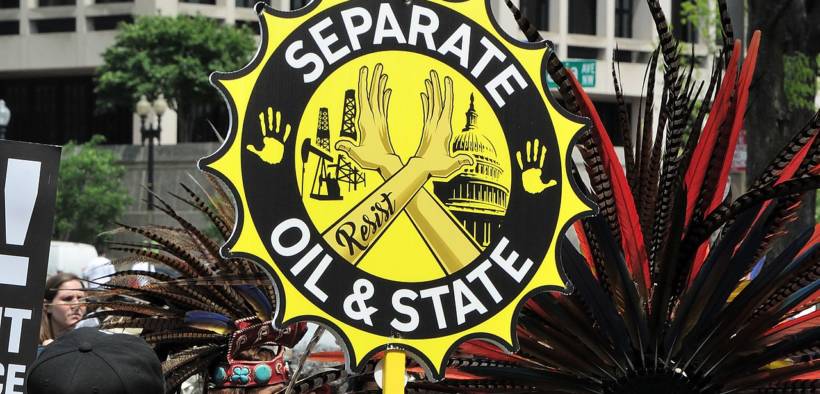Expansion of Fed Lending Program Blasted as Bailout for ‘Toxic and Reckless’ Fossil Fuel Industry

“Rescuing fossil fuel production is absolutely the wrong direction for public health amid a global pandemic.”
(By: Jessica Corbett, Common Dreams) The Federal Reserve came under fire Thursday for expanding its emergency Main Street Lending Program in a way that, as the watchdog group Public Citizen warned, “could allow failing, highly indebted oil and gas companies to borrow money at low rates.”
The purpose of the program is “to support lending to small and medium-sized businesses that were in sound financial condition before the onset of the Covid-19 pandemic,” according to the central bank.
“The Fed should not be in the business of bailing out companies that were in terminal decline and suffering largely from their own misadventures well before the coronavirus pandemic,” David Arkush, managing director of Public Citizen’s climate program, said in a statement Thursday.
CNN reported on the Fed’s expansion:
The Main Street program, which has yet to launch, will now be open to companies with up to 15,000 employees, or up to $5 billion in annual revenue. Previously, the program was limited to companies with up to 10,000 employees and $2.5 billion in revenue.
At the same time, the program will also welcome smaller companies. The Fed said the minimum loan size will double to $1 million.
The changes will allow larger, smaller, and more leveraged companies to tap the lending facility, which is aimed at helping American businesses stay alive during what could be the biggest economic shock in U.S. history.
Even as Fed officials said the expansion of the program was not specifically aimed at benefiting the oil and gas industry, Public Citizen raised concerns that it could now do exactly that. The group also noted that the announced changes align with calls from the fracking industry and GOP Sen. Ted Cruz of Texas (pdf) to ease restrictions on refinancing debts.
“The fracking industry is notoriously overleveraged, and fracking gas is not even profitable,” said Arkush. “Rescuing fossil fuel production is absolutely the wrong direction for public health amid a global pandemic. Fossil fuel combustion produces air pollution that kills hundreds of thousands of Americans and millions more globally each year.”
“The same pollution also substantially increases Covid-19 mortality,” he added, referencing recent research tying heavy air pollution to higher risk of dying from the respiratory illness. “This is all without considering the cascade of public health and economic crises we face due to fossil-fuel-induced climate chaos.”
At @TedCruz‘s behest, the Fed unveiled a program to resuscitate the fracking industry.
Rescuing fossil fuels is absolutely the wrong direction for public health amid a global pandemic.
We should be phasing out this toxic industry as swiftly as possible. https://t.co/eV0X2qeccX
— Public Citizen (@Public_Citizen) April 30, 2020
“The U.S. should be working to phase out fossil fuels as swiftly as possible, not rescuing a toxic and reckless industry that is already in a terminal, albeit too slow, decline,” according to Arkush. “The transition away from fossil fuels will require massive investments that will create millions of jobs. U.S. recovery spending that doesn’t directly target public health and blameless companies and workers should be aimed squarely at accelerating this transition, not stalling it.”
Governments worldwide are facing pressure to prioritize public health, relief for workers, and climate action in policies addressing the pandemic and resulting economic crisis. The Trump administration and congressional Republicans have been criticized for ignoring demands for a “people’s bailout” and “just recovery,” and instead favoring support for major corporations, including dirty energy companies.
Public Citizen is among about 1,000 groups and community leaders—along with nearly 100 members of Congress—that have signed on to a joint demand for “an inclusive bailout, by and for the people.” Specifically, the groups call for treating health as the top priority, providing economic relief directly to people, helping workers and communities rather than corporate executives, investing in a regenerative economy while preventing future crises, and protecting the democratic process.
Echoing those calls in his comments about the Fed program, Arkush explained that “the real concern in the oil and gas industry is that workers are losing jobs, as they are in so many other sectors.”
“The response here should be to rescue the workers and provide relief to state and local governments straining to meet the many challenges of this pandemic at the same time as their revenues decline sharply,” he said. “It should not be to rescue reckless, polluting, humanity-endangering, and often dishonest companies that were in plenty of trouble of their own making well before this pandemic began.”









